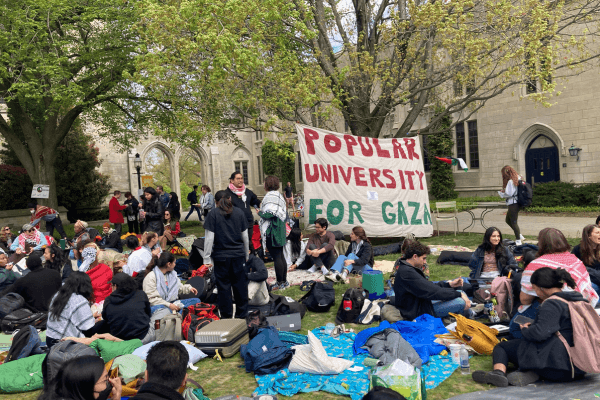Alejandra Bedoya, 14, shows visitors around her family coffee farm in southwest Colombia: The steep hills are dark green with coffee bushes, the air is alive with birdsong and the coffee drying in the sun emits a sweet, rich fragrance.
Things haven’t always been tranquil in southern Tolima, which is not too far from the birthplace of the now-demobilized Revolutionary Armed Forces of Colombia (FARC) guerilla group. The FARC and Colombian government were embroiled in more than 50 years of open conflict until a peace deal in 2016.
The presence of sustainable, profitable economic activities is a key ingredient to the peace of any region, especially areas where ex-combatants live.
In Planadas, a municipality in southern Tolima, a local coffee growers collective is training dozens of young people like Bedoya in every aspect of the supply chain, including coffee tasting, barista skills, and identifying bird biodiversity on their own farms. The collective has the backing of international donors, including the Roman Catholic Church.
Jhon Hueje, the current mayor of Planadas where Bedoya lives, said more than half of the 26,000 residents are people under 30 and that youth development and employment are key to the future there.
“It's necessary to look at the potential of the region and make sure that the education system is lining up with what the region needs,” Hueje said. “You can’t turn the page without recognizing that a second chance is needed.”
The local organization doing the training is the Association of Agricultural Producers of Specialty Coffee of Planadas (ASOPEP, for its initials in Spanish), which was founded in 2013 by local farmers wanting to focus on sustainable, high quality coffee.
Camilo Enciso, the general manager of ASOPEP, said Colombia’s traditional coffee region, the eje cafetero, has struggled in recent years as young people from the rural areas move to university towns. But the opposite has happened in Planadas, which is about 125 miles south of the eje cafetero.
“We have brought the sons and daughters of the coffee farmers to the co-op and they can see every stage of the process of coffee,” Enciso said, adding that education in coffee tasting, barista skills and coffee cultivation helps the children to see how they could produce high quality coffee when they grow up.
“It's not education to get out of [Planadas], it’s education to stay and to improve life on the farm, which is fundamental to a good life overall,” Enciso said.
Role of the church
Although a large proportion of the funds for ASOPEP’s programs have come from the United Nation’s multi-donor peace fund, a small but significant portion came via a grant from the Roman Catholic Church and they are already collaborating with a Catholic education provider to further improve educational outcomes in Planadas.
During a visit of international donors and Colombian government officials, ASOPEP showed off their coffee education centre, a natural coffee dryer and a threshing machine, paid for by a $23,600 grant from the Vatican.
In 1992, Pope John Paul II created the Populorum Progressio Foundation for Latin America and the Caribbean, which aims to aid in the “human development” of farming communities and other rural populations.
ASOPEP was able to apply for and win a competitive grant from the fund, and the project fixed two problems: the lack of coffee drying machines and lack of machinery needed to process “natural” coffee, that is, coffee dried inside the coffee fruit instead of being pulped first. ASOPEP is now applying for another Vatican grant to further improve their infrastructure.
The collective is also looking to collaborate more closely with the University Corporation El Minuto de Dios, the education arm of the faith-based NGO Minuto de Dios (most famous for their decades-long pastoral radio and TV show) and the largest private tertiary education provider in Colombia.
Father Camilo Bernal, who was visiting Planadas as a representative of Colombian civil society and a former rector of the University Corporation El Minuto de Dios, said the Catholic organization has been working with the Colombian Coffee Growers Federation to train young people in the coffee sector.
“The idea is to put the education close to where the young people are so that they can help to open up the touristic, agricultural, and cultural potential of the region, so that they fall in love with their own region,” Bernal said.
“The young people are the present and future of a society,” Bernal said, adding that El Minuto de Dios already has educational facilities in northern Tolima and hopes to expand into southern Tolima.
“Pope Francis has been very clear: We, as the church, can’t just stay in the cities,” Bernal said, “The Pope has said that we have to go out into the periphery and empower those who live there.”
From heartache to hope
Bedoya’s mother, Aceneth Bedoya, who helped found ASOPEP, said that in the years before the peace deal, the FARC would often recruit children of Alejandra's age to join the militia. Aceneth said people in the area had been killed or driven out because they had been perceived to give help to one side or the other in the conflict.
“We were in the cross-fire … and the fear we have is a return to those days,” the elder Bedoya said. "But the youth of today, they haven’t seen the uniforms of fighters. Now the work is more to show them a different path.”
Alejandra Bedoya said her relationship with coffee changed when she went to the ASOPEP headquarters with her mother and participated in a coffee tasting.
“I lived all my life in this coffee zone, but for the longest time, I thought it was just growing, collecting, and drying,” Bedoya said. “When I started, I couldn’t find the flavors — it all tasted like water.”
But after the tasting, she was able to identify certain flavors, and she wanted to learn more about the process of coffee cultivation and roasting.
“In every cup, there was a different coffee from a different producer, so I was able to taste all the differences in the way that they grew and processed it,” Bedoya said.
In 2018, ASOPEP gave her the opportunity to go to an international coffee fair in the Colombian capital of Bogota to talk about the coffee that her mother produces on the farm.
“I had never seen a barista before,” Bedoya said. “Espressos, drawing patterns in the milk, bitter coffees, sweeter coffees, filters — it was an entirely different world.”
Her family’s coffee is now sold as far away as Paris, and Bedoya said her current plan is to spend two and a half years studying at a technical college before pursuing a masters in agronomy (crop production and soil management).
“I know that with a degree in agronomy, I can search for work, climb the ladder, become the boss, then I can run various farms like the one my family has,” Bedoya said. “So many people are afraid to come here, [saying] ‘oh, it's a post-conflict zone, it must be dangerous,’ but everything is changing — we are uniting in peace.”
Coffee as a peace crop
Julián Gamboa, an impact manager at Urbania Cafe, a coffee-roasting company that sells specialty coffee but isn’t involved with ASOPEP, said projects like ASOPEP’s are vital to territories of former guerrilla members in Colombia’s coffee industry and post-agreement landscape.
“It is a crop that generates a lot of employment and it has been lately viable economically,” he said. “It is also a more stable economic opportunity when the focus is producing specialty coffee and the government or international aid programs seek commercial allies for the farmers and associations.”
Gamboa said farmers need specific skills to produce specialty coffee and many times the farmers that are more open to learning about new ways of doing things are the younger generations.
“Training highly engages the younger generations with the labor and gives them options not only at the farms but also as coffee roasters, tasters, baristas, and traders,” Gamboa said. “It generates other employment options for them.”
Gamboa said he was optimistic about the ability of youth programs like the one in Tolima to make actual change in the lives and livelihoods of these communities, especially when it comes to training young people in coffee tasting.
“It is a very useful skill when it comes to trading specialty coffee and working alongside farmers to improve their quality,” he said, adding that farmers who are able to recognize the quality and characteristics of their own coffee can negotiate a better price when selling.
“I've seen many cases of young people that weren't interested in coffee production become interested in coffee through barista courses,” Gamboa said. “They start to perceive coffee in a different way and become ambassadors of the coffee of their regions.”
Got something to say about what you're reading? We value your feedback!








